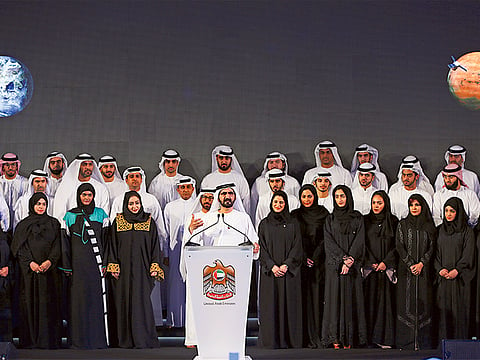UAE Mars mission: New era in space exploration
2021 will mark the UAE’s quest to explore the Red Planet

Dubai: In less than 50 years, the UAE rose from sand and opened itself to the world. At the start of the next 50 years of its nationhood in 2021, it will once again open itself — on a much larger scale this time — to the cosmos.
The UAE’s Mars mission in 2021, announced in July last year, will bring the first Arab country to the arena of space exploration traditionally dominated by the US, Russia, and other countries over the past 50 years.
The Emirati-led mission will bring unmanned probers to join the epic quest for signs of life and potential for habitability on the Red Planet. The 60 million-kilometre journey will take roughly nine months.
“The UAE Mars probe represents the Islamic world’s entry into the era of space exploration. We will prove that we are capable of delivering new scientific contributions to humanity,” President His Highness Shaikh Khalifa Bin Zayed Al Nahyan said during the launch last year.
Last month, the UAE Space Agency announced its partnership with its French counterpart, Centre National d’Etudes Spatiales (CNES), to carry out joint studies and programmes and trainings.
Dr Humaid Majol Al Nuaimi, President of the Arab Union for Astronomy and Space Science, lauded the UAE government’s bold move.
“The UAE made a strong step to go into space technology and build its own space probe. Mars is a very important planet in relation to Earth because Mars comes closest to Earth in terms of similarities [and characteristics],” Dr Al Nuaimi told Gulf News.
“The atmosphere of Mars now is similar to the atmosphere of the planet Earth when it was formed billions of years ago. Although it is 95 per cent carbon dioxide and we cannot live on it now, perhaps in the future, and I’m thinking of millions of years from now, maybe we can.”
Mars and Earth were much more similar around 3.8 to 3.5 billion years ago according to the National Aeronautic and Space Administration (Nasa). The earth had no oxygen when it was first formed but was made entirely of carbon dioxide and nitrogen.
Scientific findings point to photosynthetic bacteria that developed on earth and produced enough oxygen to support life. This search for these potential microbes in Mars continues until now.
Dr Al Nuaimi said another benefit of the Martian mission is opening up its young people to new challenges in science and space technology, a field Emiratis don’t venture into traditionally.
Also, to give the public a chance to be part of the mission in some way, the public was given a chance to name the mission to Mars.
Sign up for the Daily Briefing
Get the latest news and updates straight to your inbox



